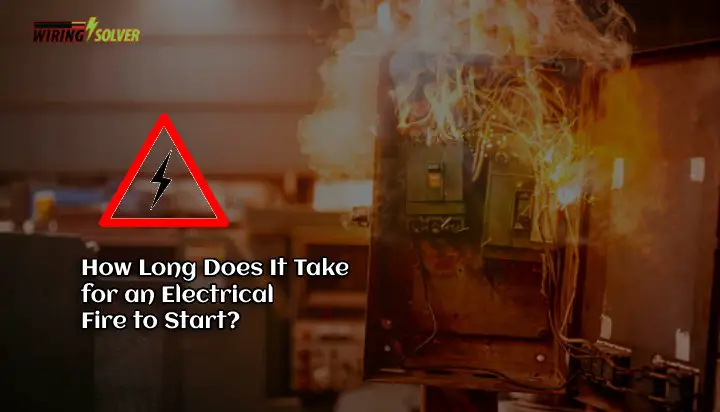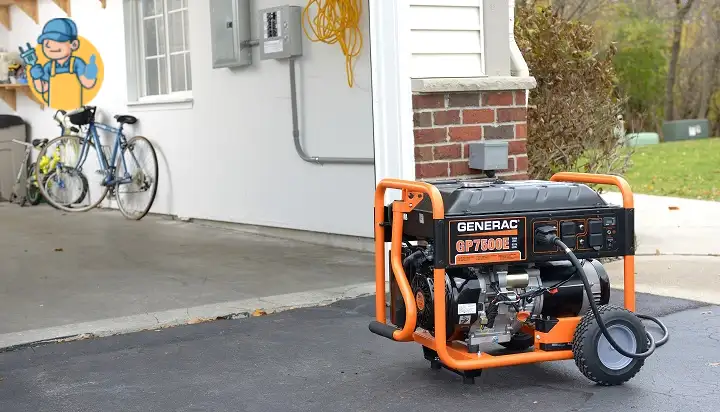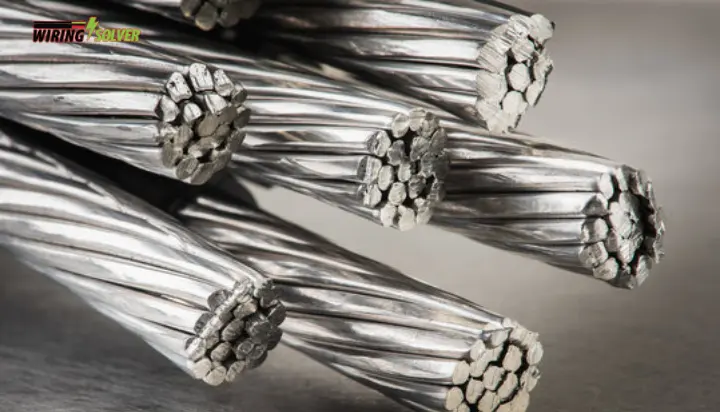Electrical fires are a nightmare. They take away many lives each year and can cause a huge amount of financial damage. It is necessary to stay highly cautious to spot and prevent such occurrences.
One might wonder, how long does it take for an electrical fire to start?
Well, there is no definite answer to that unless you provide a scenario with that question. Some electrical fires can happen instantly, while some may take a few years.
This article will provide you answers to all that you need regarding the timeframe of an electrical fire, alongside its causes, and how to prevent it.

What Might Cause an Electrical Fire?
Prevention is better than cure, and to prevent an electrical fire, one must know how they start. So, how do electrical fires start? Or to better put it, what might cause an electrical fire to start?
Loose Wiring:
Loose wires when in contact with another live wire, will cause a short circuit. Electrical shorts are as dangerous as they get. Especially if you do not have a safety precaution such as a GFCI breaker installed.
You have to keep a lookout for signs of electrical fire in walls. Which include abnormal warm spots on random parts of the wall, a malfunctioning socket, etc.
Prolonged Usage of Damaged Switches and Sockets:
Electrical equipment is not you would want to take a chance on. You might think that the crackling light switch does not need to be replaced at the moment, it could still serve you a month or two.
But that’s where you are wrong. At any point, that switch can start an electrical fire. Resulting in far greater financial damage than buying a new set of electrical switches.
Old/Damaged Cables:
Electrical wires have a certain lifespan. 5 years, 10 years, or even 20 years. Once that period is over, the wire covers begin to deteriorate.
With enough wear and tear, they may expose the bare copper conductors within them. This can lead to a short circuit. So, can an electrical fire start if nothing is plugged in? Definitely. Damaged cables can easily start an electrical fire within your walls.
Circuit Overloads:
A common mistake many people commit without knowing the full extent of its damage is overloading their circuits. There is a limit on how many things can be plugged into one outlet.
Each circuit has a limited amount of current it can accommodate through it. Once you exceed that limit, the circuits start struggling to keep up with the appliances.
As a result, more heat is generated. And in the worst-case scenario, an electrical fire can start.
User Carelessness:
Let’s take electric heaters as an example for this instance. It is estimated that heaters are associated with about 21,800 residential fires every year.
The sad thing about this is that most of these fires could have been prevented if only the owners were more careful with the placement and position of the heater.
How Long Does It Take for an Electrical Fire to Start?
There is no definite answer to this question. The fire can start immediately, in a few minutes or an hour, or it could even take years. It all depends on several factors. Let’s talk about several different scenarios.
- A Few Seconds: Imagine a short circuit in an area surrounded by chemicals or flammable objects. It would instantly set everything ablaze and cause an electrical fire. Not to mention electrical sparks falling on something extremely flammable, such as oil or alcohol. It would take an extremely horrible turn if the occurrence happens in a warehouse of any sort.
- A Few Minutes: An electrical heater tipped over on a furry carpet. It would take a few minutes for the heater to set fire to the carpet and then spread further. Or an energized neutral occurring from the main utility of your household. Based on how your house is wired and how the water is maintained, it could spell disaster for your entire household in just a few minutes.
- A Few Hours: Circuit overloading can take a few hours to cause an electrical fire. Imagine an overloaded extension cord that has been placed under a rug. It would slowly generate enough heat in a few hours hot enough to set fire to the rug.
- A Few Years: Cheap wiring materials or a subpar wiring job can place the entire circuitry of the house in jeopardy. It can take a few years for the materials to wear down until eventually one day you have a house fire. That is why it is never a good idea to be cheap when it comes to electrical material.
How Can I Prevent Electrical Fires?
As stated earlier, prevention is better than cure. Preventing an electrical fire only requires a bit of sincerity and caution. These are some of the factors to be mindful of to prevent an electrical fire.
- If the wiring of your household has been installed for over 10 years, get it checked by a licensed professional for a proper diagnosis of the health of the wiring.
- If there are any broken switches or sockets in your household, get them replaced as soon as possible. And do not use them until fixed.
- During any electrical installation, make sure that every joint and connection is made secure properly.
- Be mindful of your electrical equipment. Especially things that generate a great amount of heat. A table lamp, an iron, or a space heater.
- If you have pets, they can easily trip over a heater or a lamp, or drop a piece of fabric on them. Which could cause a fire. So, pay extra caution while using these items if you have a pet.
- Do not overload an electrical circuit. Make sure to stay well below the capacity of each circuit. And do not plug high-power-consuming devices into one circuit.
Alongside these, you also have to be on the lookout for signs of electrical fires. But how do you know when an electrical fire is starting? There are a few telltale signs of an electrical fire.
- Frequent Circuit Breaker Tripping
- Burning Smell
- Discolored Outlets
- Warm Switches
- Abnormal Behavior of Electrical Equipment… etc.
What does the start of an electrical fire smell like? Electrical fires tend to smell like burning plastic.
Summary
Now, I hope that this article has given you a clearer idea about how long does it take for an electrical fire to start.
Electrical fires are as dangerous as they can get. Both for the safety of your household and your life. If you suspect such a case, take immediate action to minimize the loss as much as possible.



![Transfer Switch Vs Interlock [Know The Difference]](https://wiringsolver.com/wp-content/uploads/2022/05/Transfer-Switch-Vs-Interlock.jpeg)
![Why Does My Neutral Wire Have Voltage? [Answered]](https://wiringsolver.com/wp-content/uploads/2022/04/Why-Does-My-Neutral-Wire-Have-Voltage.jpeg)

